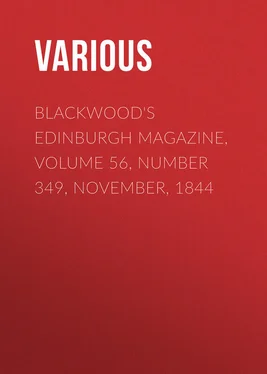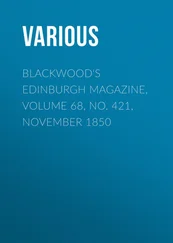Various - Blackwood's Edinburgh Magazine, Volume 56, Number 349, November, 1844
Здесь есть возможность читать онлайн «Various - Blackwood's Edinburgh Magazine, Volume 56, Number 349, November, 1844» — ознакомительный отрывок электронной книги совершенно бесплатно, а после прочтения отрывка купить полную версию. В некоторых случаях можно слушать аудио, скачать через торрент в формате fb2 и присутствует краткое содержание. Издательство: Иностранный паблик, Жанр: periodic, foreign_edu, Путешествия и география, на английском языке. Описание произведения, (предисловие) а так же отзывы посетителей доступны на портале библиотеки ЛибКат.
- Название:Blackwood's Edinburgh Magazine, Volume 56, Number 349, November, 1844
- Автор:
- Издательство:Иностранный паблик
- Жанр:
- Год:неизвестен
- ISBN:нет данных
- Рейтинг книги:4 / 5. Голосов: 1
-
Избранное:Добавить в избранное
- Отзывы:
-
Ваша оценка:
- 80
- 1
- 2
- 3
- 4
- 5
Blackwood's Edinburgh Magazine, Volume 56, Number 349, November, 1844: краткое содержание, описание и аннотация
Предлагаем к чтению аннотацию, описание, краткое содержание или предисловие (зависит от того, что написал сам автор книги «Blackwood's Edinburgh Magazine, Volume 56, Number 349, November, 1844»). Если вы не нашли необходимую информацию о книге — напишите в комментариях, мы постараемся отыскать её.
Blackwood's Edinburgh Magazine, Volume 56, Number 349, November, 1844 — читать онлайн ознакомительный отрывок
Ниже представлен текст книги, разбитый по страницам. Система сохранения места последней прочитанной страницы, позволяет с удобством читать онлайн бесплатно книгу «Blackwood's Edinburgh Magazine, Volume 56, Number 349, November, 1844», без необходимости каждый раз заново искать на чём Вы остановились. Поставьте закладку, и сможете в любой момент перейти на страницу, на которой закончили чтение.
Интервал:
Закладка:
Various
Blackwood's Edinburgh Magazine, Volume 56, Number 349, November, 1844
THE O'CONNELL CASE – WAS THE JUDGMENT RIGHTLY REVERSED?
The astounding issue of the Irish State trials will constitute a conspicuous and mortifying event in the history of the times. A gigantic conspiracy for the dismemberment of the empire was boldly encountered at its highest point of development by the energy of the common law of the land, as administered in the ordinary courts of justice. That law, itself certainly intricate and involved, had to deal with facts of almost unprecedented complication and difficulty; but after a long and desperate struggle, the law triumphed over every obstacle that could be opposed to it by tortuous and pertinacious ingenuity: the case was correctly charged before the jury; most clearly established in evidence, so as to satisfy not them only, but all mankind; the jury returned a just verdict of guilty against all the parties charged – the court passed judgment in conformity with that verdict, awarding to the offenders a serious but temperate measure of punishment – imprisonment, fine, and security for good behaviour. The sentence was instantly carried into effect —
"And Justice said – I'm satisfied."
But, behold! a last desperate throw of the dice from the prison-house – a speculative and desponding appeal to the proverbial uncertainty of the law; and, to the unspeakable amazement and disgust of the country, an alleged technical slip in the conduct of the proceedings, not touching or even approaching, the established merits of the case either in fact or law, has been held, by the highest tribunal in the land, sufficient to nullify the whole which had been done, and to restore to liberty the dangerous delinquents, reveling in misrepresentation and falsehood concerning the grounds of their escape on punishment – in their delirium of delight and triumph, even threatening an impeachment against the officers of the crown, against even the judges of the land, for the part they have borne in these reversed proceedings!
Making all due allowance for these extravagant fooleries, it is obvious that the event which has given rise to them is one calculated to excite profound concern, and very great curiosity . The most sober and thoughtful observers are conscious of feeling lively indignation at the spectacle of justice defeated by a technical objection; and public attention has been attracted to certain topics of the very highest importance and delicacy, arising out of this grievous miscarriage. They are all involved in the discussion of the question placed at the head of this article; and to that discussion we propose to address ourselves in spirit of calmness, freedom, and candour. We have paid close attention to this remarkable and harassing case from first to last, and had sufficient opportunities of acquainting ourselves with its exact legal position. We deem it of great importance to enable our readers, whether lay or professional, to form, with moderate attention, a sound judgment for themselves upon questions which may possibly become the subject of early parliamentary discussion – Whether the recent decision of the House of Lords, a very bold one unquestionably, was nevertheless a correct one, and consequently entitling the tribunal by whom it was pronounced, to the continued respect and confidence of the country? This is, in truth, a grave question, of universal concern, of permanent interest, and requiring a fearless, an honest, and a careful examination.
The reversal of the judgment against Mr O'Connell and his companions, was received throughout the kingdom with perfect amazement. No one was prepared for it. Up to the very last moment, even till Lord Denman had in his judgment decisively indicated the conclusion at which he had arrived on the main point in the case, we have the best reason for believing that there was not a single person in the House of Lords – with the possible exception of Lords Denman, Cottenham, and Campbell – who expected a reversal of the judgment. So much has the public press been taken by surprise, that, with the exception of a fierce controversy between the Standard , and Morning Herald , and the Morning Chronicle , which was conducted with great acuteness and learning, we are not aware of any explanation since offered by the leading organs of public opinion – the Times has preserved a total silence – as to the legal sufficiency or insufficiency of the grounds on which this memorable judgment of reversal proceeded. We shall endeavour to do so; for while it is on this side of the Channel perfectly notorious that the traversers have been proved guilty of the enormous misdemeanours with which they were charged – guilty in law and guilty in fact – on the other side of the Channel we find, since commencing this article, that the chief delinquent, Daniel O'Connell, has the amazing audacity, repeatedly and deliberately, to declare in public that he has been "acquitted on the merits!" Without pausing to find words which would fitly characterize such conduct, we shall content ourselves with the following judicial declaration made by Lord Brougham in giving judgment in the House of Lords, a declaration heard and necessarily acquiesced in by every member of the court: —
"The whole of the learned judges with one voice declare, that on the merits, at any rate, they have no doubt at all – that on the great merits and substance of the case they are unanimously agreed. That a great offence has been committed, and an offence known to and recognisable by the law; that a grave offence and crime has been perpetrated, and an offence and crime punishable by the admitted and undoubted law of the land, none of the learned judges do deny; that counts in the indictment to bring the offenders, the criminals, to punishment, are to be found, against which no possible exception, technical or substantial, can be urged, all are agreed; that these counts, if they stood alone, would be amply sufficient to support the sentence of the court below, and that that sentence in one which the law warrants, justifies, nay, I will even say commands, they all admit. On these, the great features, the leading points, the substance, the very essence of the case, all the learned judges without exception, entertain and express one clear, unanimous, and unhesitating opinion. " And yet all the proceedings have been annulled, and the perpetrators of these great crimes and offences let loose again upon society! How comes this to pass? is asked with astonishment wherever it is heard of, both in this country – and abroad.
The enquiry we propose is due with reference to the conduct and reputation of three great judicial classes – the judges of the Irish Queen's Bench: the judges of England: and the judges of the court of appeal in the House of Lords. Familiar as the public has been for the last twelve months with the Irish State Trials, the proceedings have been reported at such great length – in such different forms, and various stages – that it is probable that very few except professional readers have at this moment a distinct idea of the real nature of the case, as from time to time developed before the various tribunals through whose ordeal it has passed. We shall endeavour now to extricate the legal merits of the case from the meshes of complicated technicalities in which they have hitherto been involved, and give an even elementary exposition of such portions of the proceedings as must be distinctly understood, before attempting to form a sound opinion upon the validity or invalidity of the grounds upon which alone the judgment has been reversed.
The traversers were charged with having committed the offence of conspiracy; which, by the universally admitted common law of the land for considerably upwards of five hundred years, exists " where two, or more than two, agree to do an illegal act – that is, to effect something in itself unlawful, or to effect by unlawful means something which in itself may be indifferent, or even lawful." 1 1 See the Judgment of the Judges, ordered by the House of Lords to be printed, (and from which the quotations in this article have been made,) read to the House of Lords by Lord Chief-Justice Tindal, on the 2d September 1844.
Интервал:
Закладка:
Похожие книги на «Blackwood's Edinburgh Magazine, Volume 56, Number 349, November, 1844»
Представляем Вашему вниманию похожие книги на «Blackwood's Edinburgh Magazine, Volume 56, Number 349, November, 1844» списком для выбора. Мы отобрали схожую по названию и смыслу литературу в надежде предоставить читателям больше вариантов отыскать новые, интересные, ещё непрочитанные произведения.
Обсуждение, отзывы о книге «Blackwood's Edinburgh Magazine, Volume 56, Number 349, November, 1844» и просто собственные мнения читателей. Оставьте ваши комментарии, напишите, что Вы думаете о произведении, его смысле или главных героях. Укажите что конкретно понравилось, а что нет, и почему Вы так считаете.












